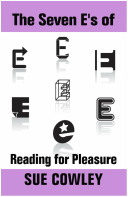
The Seven E's of Reading for Pleasure
Extract: Developing a 'Reading for Pleasure Policy' (You can buy the book here.)
Here are some useful questions for thinking about what should go into a ‘Reading for Pleasure Policy’:
* Who is your policy for and why does your setting feel it is important for children and adults to read for pleasure?
* How can you ensure access and equality for all in reading for pleasure? How will you make time in lessons for this?
* Have you included references to texts from other cultures, and in other languages?
* How can you support children with special educational needs and/or disabilities in reading for pleasure?
* How will you use special technologies to help children access texts?
* What different kinds of text might be read for pleasure in your school or setting and how will you check that all these kinds of texts are available?
* What role would you like different members of staff to take in encouraging children to read for pleasure?
* How will your policy work across the curriculum – what role do you want teachers of subjects other than English to play?
* How will you link with and support families in helping their children to want to read for pleasure?
* How would you describe your commitment to your library as a key resource in children reading for pleasure? How can you support wider access to your library including during breaks, before and after school and outside of term times?
* What role does your local (non-school) library have to play in your policy? How will you develop links to ensure that all children have access to books outside school?
* What kind of budget will you provide to support activities around reading for pleasure, and who will be in charge of this budget?
* What commitment will you make to training and continuing professional development to support your work in this area?
* How you will evaluate your policy and its effectiveness, and adapt it on an ongoing basis?
Extract: Developing a 'Reading for Pleasure Policy' (You can buy the book here.)
Here are some useful questions for thinking about what should go into a ‘Reading for Pleasure Policy’:
* Who is your policy for and why does your setting feel it is important for children and adults to read for pleasure?
* How can you ensure access and equality for all in reading for pleasure? How will you make time in lessons for this?
* Have you included references to texts from other cultures, and in other languages?
* How can you support children with special educational needs and/or disabilities in reading for pleasure?
* How will you use special technologies to help children access texts?
* What different kinds of text might be read for pleasure in your school or setting and how will you check that all these kinds of texts are available?
* What role would you like different members of staff to take in encouraging children to read for pleasure?
* How will your policy work across the curriculum – what role do you want teachers of subjects other than English to play?
* How will you link with and support families in helping their children to want to read for pleasure?
* How would you describe your commitment to your library as a key resource in children reading for pleasure? How can you support wider access to your library including during breaks, before and after school and outside of term times?
* What role does your local (non-school) library have to play in your policy? How will you develop links to ensure that all children have access to books outside school?
* What kind of budget will you provide to support activities around reading for pleasure, and who will be in charge of this budget?
* What commitment will you make to training and continuing professional development to support your work in this area?
* How you will evaluate your policy and its effectiveness, and adapt it on an ongoing basis?